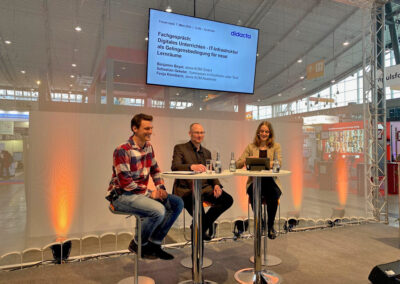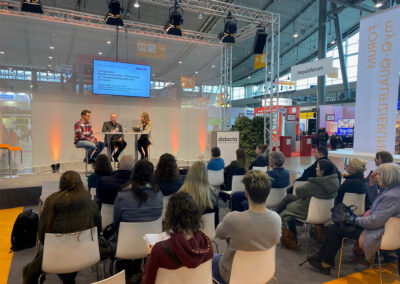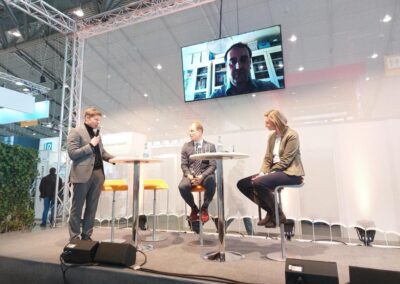
Days full of insights come to an end – The aconium Academy at didacta
The education trade fair didacta took place from March 7 to 11 in Stuttgart and the Academy was there live. In the early afternoon of the first day of the fair, it chaired a panel on the shortage of skilled workers. Visitors to the trade fair were able to attend a lively discussion on the topic of “Digital transformations require specialist knowledge and skilled workers – countering the shortage”. Moderated by Widar Wendt (aconium Academie), the experts Wolfgang Heer (Managing Director of Bundesverband Glasfaseranschluss BUGLAS), Daniel Hoffmann (Authorized Signatory and Technical Director of Kabel+Satellit Bergen Kommunikationstechnik GmbH) and Gabi Schermuly-Wunderlich (Managing Director of ArGe Medien im ZVEH) gave an insight into the shortage of skilled workers, especially in the field of fibre optic and network expansion. They discussed the visibility of the skills shortage and how it can be solved in practice. The panelists agreed that the attractiveness of training and working in the electrical and IT trades must be increased. An essential part of this is that training occupations are treated on an equal footing with academic careers and that it is shown that a training occupation is not the end of a professional career. For example, even after completing an apprenticeship, there are a wide range of qualification opportunities in the form of further training. Regardless of the type of school, this can be achieved with more mandatory internships during the school years, which can provide practical insights into the skilled trades. In turn, companies should enable their staff to gain further training and qualifications.
In addition to the panel discussion on the skills shortage, the aconium Academy led an expert discussion on the topic of “Digital teaching – IT infrastructure as a prerequisite for success in new learning spaces”. The participants in the discussion were Benjamin Beyer (aconium) and Sebastian Gekeler (secondary school teacher). Moderated by Fenja Kleinbach (aconium Academy), they held an expert discussion about the IT infrastructure in schools and other educational institutions. It emerged that the digitalization of schools is progressing, but that the IT infrastructure is often not planned sustainably. This is precisely what enables schools to use IT devices and sufficient broadband coverage, for example. A functioning IT infrastructure is also essential for educational institutions in other areas of education, such as adult education. In addition, the degree of digitalization varies greatly from school to school. The goal is the same for all schools: digital options must be usable and interlinked throughout. Among other things, this includes the availability of scalable infrastructure in the classrooms, a sufficient number of devices and investment in further training for teachers. The expert discussion was well attended and reflected the interest of the audience in this important topic for society.



